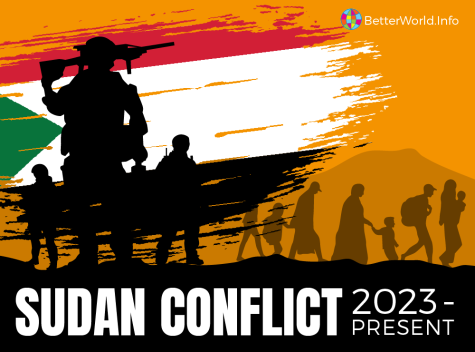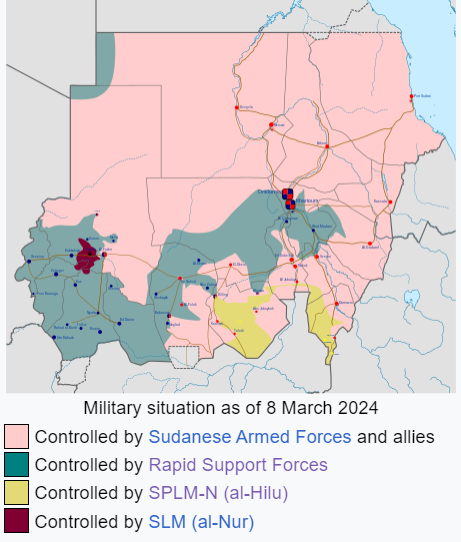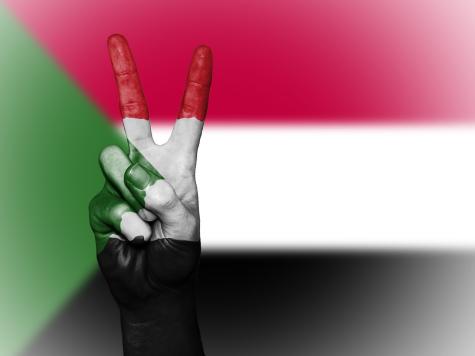Armed conflict in Sudan 2023

➡️ Sudan Civil War 2023 - Present: The Forgotten Conflict
The conflict in Sudan stems from ethnic tensions, economic disparities, and many years of political instability. The civil war is now entering its second year as the two warring factions remain locked in a power struggle which has led to the death of 61,000 people.
The war has triggered the largest displacement crisis ever witnessed, and crippling food insecurity has led to the world's largest hunger crisis. Discover over 2,000 resources in our guide to the unrelenting ➡️ conflict in Sudan.
As the world's attention is diverted to other crisis regions such as Ukraine and Gaza, we must push for humanitarian aid, peaceful solutions, and an end to impunity for the serious human rights atrocities and ethnic cleansing taking place in Sudan.
As the violence over leadership between the Sudanese Armed Forces (SAF) and the Rapid Support Forces (RSF) escalates, the implications for Sudan's seven bordering countries heightens. In this fragile region of the world, the influx of more than 2 million externally displaced refugees is placing an enormous strain on scarce resources and the danger of the conflict spreading is deeply concerning.
Follow all developments with our timeline of the conflict, and stay informed with our guides to key background information such as the nonviolent 2019 People’s Revolution, the 2021 army coup and the resulting power-sharing agreement.

What are the Root Causes of Fighting in Sudan?
Fighting began between the rival factions in April 2023 as the SAF led by General Abdel Fattah al-Burhan, and the powerful paramilitary group RSF led by Mohamed Hamdan Dagalo fought over control of the state and its valuable resources.
Since gaining independence in 1956, Sudan has experienced three civil wars spanning over 40 years. Sudan is the largest country in Africa, it is geographically positioned between some of the world's most volatile regions, and there is a stark economic divide between the wealthy Arab and Muslim northern region, and the less developed majority Chrisitian southern region. Internal conflicts have plagued the nation for decades.
Famine and human rights atrocities have been well documented in the country and unfortunately did not cease after the 2011 separation of states to create the Republic of South Sudan. Sudan's second civil war which led to this divide killed 2 million people.

Following a coup in 1989, oppressive dictator Omar al-Bashir led the country through the first civil war, the separation of states, and the 2003 Darfur war and genocide. He imposed strict Sharia law, introduced controversial morality police, and persecuted all other religious activity outside of Islam.
After 30 years of brutal rule, the Sudanese people rose up in the 2019 People’s Revolution where widespread protests demanded a return to democracy. The result was a army coup carried out jointly by the SAF and RSF.
The RSF are a powerful militia group formed during the Bashir era. They are responsible for brutal attacks carried out in the Darfur war, creating mass displacement, engaging in sexual violence, and other war crimes. They turned their backs on Bashir and worked alongside the SAF to create a new transitional government.
The Transistional Sovereignty Council created under Burhan and Hemedti focused on the improvement of Sudan’s dire economic situation and promoted the stabilisation of the country. However, with the constitution suspended, key international institutions including the World Bank and the International Monetary Fund paused their funding. The transition was riddled with controversy, violence, and the lack of civilian leadership was again met with large-scale protests.
A two-year transition deal to bring about civilian rule was then rejected by the Sudanese people due to the lack of accountability for the heinous actions of both military factions. A power struggle began to emerge between the two as violent disagreements and tensions stalled all transition efforts.
It came to head in April 2023 as SAF troops and RSF soldiers were deployed throughout Sudan. Foreign interference from the United Arab Emirates, the U.S., the Wagner group (Russia), and the UK have further exacerbated the situation. As the promise of a long-awaited democratic transition diminished, the UN envoy to Sudan was expelled from the country as all peace attempts collapsed.
Violent clashes continue to destroy the lives of civilians on top of the difficult challenges already facing Sudanese people including disease outbreaks, economic instability, and the effects of climate change. Current fighting began at a time when the country was already experiencing its highest levels of humanitarian need in a decade.

Sudan - One of the World's Worst Humanitarian Disasters
- 30.4 million people, half of the population are currently in need of humanitarian assistance and protection. The war has created extreme shortages of food, water, medicine, and fuel.
- 24 million people are facing food insecurity, 5 million at emergency levels.
- 11.5 million people have been forcibly displaced from their homes, schools, and livelihoods – the worst displacement crisis in the world.
- 2 million people have been externally displaced to unstable areas such as Chad, Ethiopia, and South Sudan. Here refugee camps overflow and are unable to provide humane living conditions.
- 70% of healthcare facilities in conflict areas are non-operational.
West Darfur has seen the worst attacks on civilians and violations of international war. Multiple mass graves containing civilians from ethnic groups have been discovered in the region. Limited aid provisions are being systematically looted and are failing to reach the people most in need. Activists and volunteers facilitating aid deliveries face restrictions of movement, intimidation, violent attacks, and detention.
Civilians are always the biggest losers of war as their homes, lives, safety, communities, and healthcare systems are destroyed around them. Water treatment plants have been attacked and destroyed leaving residents without clean water. Many parts of the country are without electricity and communication networks. Markets, schools, medical facilities, roads, and government buildings are completely inaccessible.
Conflict-related sexual violence is rife. Women and children are suffering some of the worst conditions imaginable. Even before the start of the civil war more than 3 million women and girls were at risk of gender-based violence.
12 million children are being deprived of an education. The number of children in Sudan who are out of school has now reached 19 million.
Even before the fighting Sudan was in extreme financial crisis. Spiralling inflation and shortages of essential goods crippled the country. Half of Sudan's population is unemployed, and the Sudanese pound has halved in value.
In a country which was already struggling to meet the needs of its people, war has catapulted its citizens into unimaginable suffering and deplorable conditions. The UN and other organisations such as the International Rescue Committee are working hard to raise awareness of the dire situation and the serious need for funding and humanitarian assistance.
The time for action is now! One child dies every 2 hours in Sudanese displacement camps. Mainstream media and politicians must no longer ignore the plight of the Sudanese people, many of which only ever known war time conditions.

Is there a Chance for Peace and Reconciliation in Sudan?
Sustained violence in Sudan is showing no signs of abating. With the SAF and the RSF occupying different parts of the country, violent clashes continue to spread. Much of West and Central Darfur are under the grip of the RSF, and the eastern and southern parts of the country are dominated by SAF control.
Burhan and Hemedti have missed two separate dates to discuss options for a peaceful resolution. In October 2023, led by the U.S. and Saudi Arabia, ceasefire talks were organised in Jeddah. The talks broke down before they even began.
In December, the U.S. ramped up diplomatic efforts and exerted pressure on the generals to agree to an unconditional ceasefire, dialogue, and a face-to-face meeting. Both sides refused to engage not only with each other, but also with civilians, and international leaders. Since then, the peace process has fallen dormant.
With little room for mediation, and both sides committed to their war effort, hopes of reaching a peaceful resolution are dwindling. Sanctions by the UK and the U.S. have done little to deescalate tensions.
The UN Security Council has called for an immediate cessation of hostilities by the warring parties, as well as demanding complicity with international humanitarian law, and a removal of any obstructions to enable unhindered humanitarian access.
Foreign interference has become a huge barrier to mediation efforts as attempts at peace are undermined by various regional and global players. The ongoing foreign supply of weapons and military support to both sides enflames the situation as weapons contractors and arms traders benefit from the war.
We must continue efforts to secure a country-wide ceasefire, create a safe humanitarian corridor, and sustained peace throughout the country. Only then can the situation begin to improve for civilians.
Solutions must be found to address the underlying issues such as power sharing, economic disparity, social injustice, and ethnic violence. Local grassroots movements and international NGOs play a crucial role in peacebuilding and reconciliation by promoting dialogue and understanding among different tribal and ethnic groups in a country which is home to 500 different ethnic subgroups.
Finance to provide relief and fund peace negotiations has been incredibly difficult to secure. In 2023, the UN declared that $3 billion was needed to fund the humanitarian response in Sudan and its neighbouring countries, however only 40% of that sum was obtained.
The Sudanese people have been abandoned by the world in this forgotten conflict which has plunged civilians into the world's worst humanitarian crisis, with no glimmer of peace on the horizon.
With a complete lack of media attention, increasing difficulties regarding the distribution of aid, a funding deficit, fears of wider regional escalation, and no concerted effort to bring about peace, Sudan is at the very top of the IRC’s crisis watch list.
“Peace is not simply the absence of war. It is not a passive state of being. We must wage peace, as vigilantly as we wage war.” - Dalai Lama
Author: Rachael Mellor, 09.05.24 licensed under CC BY-ND 4.0 (Updated 03.02.25)
For further reading on the Conflict in Sudan see below ⬇️